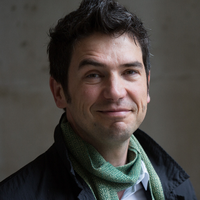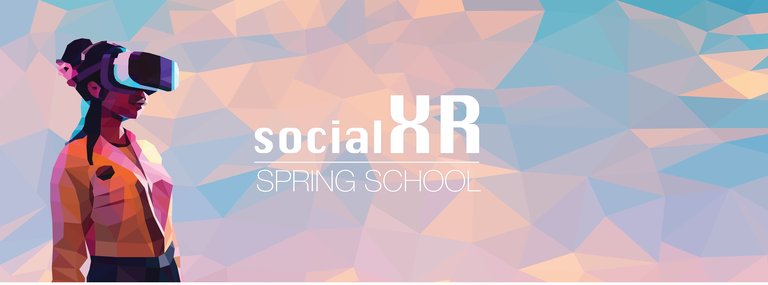As part of the 3rd edition of the Spring School on Social XR, CWI's Distributed and Interactive Systems (DIS) research group is offering the Open Lectures. The aim of these talks is to discuss Social XR as a new medium for communication and collaboration with an interdisciplinary approach. This event is open to the public, free of charge and no registration is required.
Open Lectures for the Spring School on Social XR 2025
The Distributed and Interactive Systems research group (DIS) of CWI presents the 3rd edition of the Spring School on Social XR, and organizes open and free lectures on Social XR at CWI.
Open lectures programme

* 09:30-10:30
Guo Freeman - Clemson University, USA
Talk: Novel Opportunities and Emerging Risks of Social Virtual Reality Spaces for Online Interaction
Dr. Guo Freeman is a Dean's Associate Professor in Human-Centered Computing at Clemson University. At Clemson, she directs the Gaming and Mediated Experience Lab (CUGAME). Her work focuses on how interactive technologies such as online games, esports, live streaming, social VR, and generative AI shape interpersonal relationships and group behavior; and how to design safe, inclusive, and supportive social VR spaces to combat emergent harassment risks especially for marginalized users. She has authored over 100 peer-reviewed publications and won 14 Best Paper or Honorable Mentions Awards (top 3%-5%) at ACM SIGCHI venues. She has secured $30 million in external grant funding from the US National Science Foundation, US Army, and the Air Force Office of Scientific Research. She has served as ACM CHI 2025 Games and Play Subcommittee Chair, ACM CHI PLAY 2024 General Chair, ACM GROUP 2025 General Chair, ACM CHI PLAY Steering Committee member, among other leadership roles.

* 11:00-12:00
Katrien de Moor - NTNU, Norway
Talk: Privacy, Security and UX Challenges in (Social) XR: an Overview
Katrien De Moor is associate professor at the department of Information Security and Communication Technology at NTNU, mainly focusing on socio-technical approaches in ICT research. Katrien received her PhD degree in Social Sciences from Ghent University (2012) with a thesis on bridging gaps in Quality of Experience research and its challenges. She is passionate about user research and user involvement in user-centric innovation processes.

* 09:30-10:30
Sun Joo (Grace) Ahn - University of Georgia, USA
Talk: The Multiple Dimensions of Social in Social XR
Sun Joo (Grace) Ahn (Ph.D., Stanford University) is a Professor of Advertising at the Grady College of Journalism and Mass Communication, University of Georgia. She is the founding director of the Center for Advanced Computer-Human Ecosystems (CACHE; www.ugavr.com) and the co-editor-in-chief of Media Psychology. Her main program of research investigates how immersive technologies such as virtual and augmented reality transform traditional rules of communication and social interactions, looking at how virtual experiences shape the way that people think, feel, and behave in the physical world. Her work is funded by the National Science Foundation, National Institutes of Health, National Oceanic and Atmospheric Administration, and the Environmental Protection Agency, and published in numerous top-tier outlets in the fields of communication, health, and engineering.

* 11:00-12:00
Aljosa Smolic - Hochschule Luzern, Switzerland
Talk: AI-based Volumetric Content Creation for Immersive XR Experiences and Production Workflows
Aljosa Smolic is Professor in the Computer Science Department of Hochschule Luzern in Switzerland and Co-Head of the Immersive Realities Research Lab. Before that, he was SFI Research Professor of Creative Technologies at Trinity College Dublin (TCD, 2016-2021), where he was heading the research group V-SENSE. His research interests include immersive technologies such as AR, VR, volumetric video, 360/omni-directional video, light-fields, and VFX/animation, with a special focus on deep learning in visual computing.
Background
The Future of Media Communication is Immersive. Extended Reality (XR) is paving the way for the next generation of media communication. With its interactivity, heightened realism, and personalized viewing experiences, XR is poised to transform industries ranging from cultural heritage and education to manufacturing. It also offers a climate-friendly alternative to travel, aligning with the goals of the European Green Deal.
Among the most promising advancements are Social XR-systems that go beyond the limitations of current teleconferencing tools by delivering deeper immersion, an enhanced sense of presence, and more natural interpersonal interactions. These technologies enable shared, real-time experiences between remote users, opening the door to a new era of connection and collaboration.
Despite its potential, Social XR still faces significant challenges. Achieving widespread adoption will require breakthroughs across multiple disciplines, including computer graphics, networking and systems, signal processing, multimedia systems, and the social sciences and humanities. Only through interdisciplinary collaboration can we unlock realistic, immersive, and accessible Social XR experiences for the public.
For more information about the Spring School, visit the DIS website.

